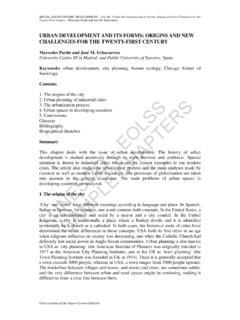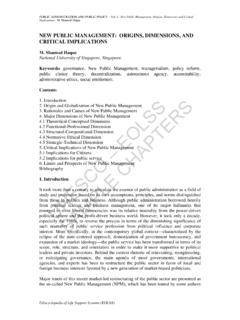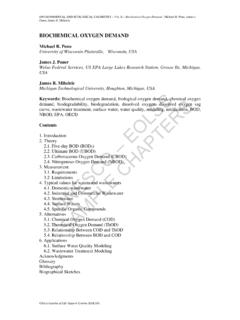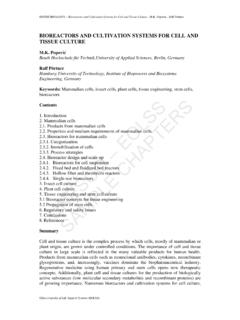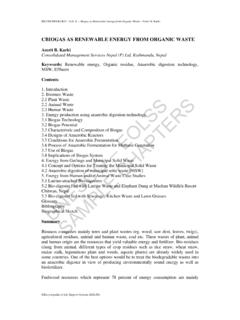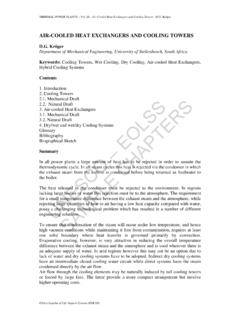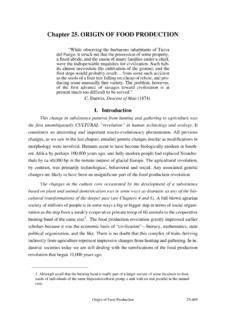Transcription of African Civilizations: From The Pre-Colonial to the Modern Day
1 WORLD CIVILIZATIONS AND HISTORY OF HUMAN DEVELOPMENT African Civilizations: From The Pre-Colonial to the Modern Day - Toyin Falola and Tyler Fleming African CIVILIZATIONS: FROM THE Pre-Colonial TO. THE Modern DAY. Toyin Falola and Tyler Fleming Department of History, University of Texas at Austin, USA. Keywords: Africa, Christianity, Civilizations, Colonialism, Imperialism, Independence, Islam, Sahara, Transatlantic Slave Trade. Contents 1. Introduction 2. Pre-Colonial societies TE SS. 3. The Spread of Islamic Civilization S. 4. Transatlantic Slave Trade 5.
2 European Exploration and the Establishment of Imperial Rule R. AP L. 6. Colonial Rule 7. World War II and the Dawn of Independence H O. 8. Africa Today Glossary C E. Bibliography Biographical Sketches E O . Summary This chapter argues that African civilizations underwent many changes since the PL C. continent's first set of people began the process of state formation. Though African civilization was and remains extremely diverse and varied, this chapter uses the M ES. common experiences of Africans in general to provide an analysis of civilization throughout the African continent.
3 The chapter stresses the resiliency and ability of the African peoples to adapt from early state formation to the present day. It demonstrates SA N. how Africa was generally harmed by Western influence from the dawn of the transatlantic slave trade to colonial domination to disproportionate commerce in today. U. 1. Introduction Though Westerners often tend to view it as one country and lump its peoples together as Africans, Africa is a huge continent (second only to Asia). These generalizations oversimplify African civilizations and the continent's diversity.
4 African environments are incredibly diverse, from dry deserts to dense rain forests. Some are conducive to trade, others are surrounded by rich mineral resources, while others possess rich soil suitable for farming. Africa's peoples and civilizations have adapted to these environments differently. As a result, today's Africa consists of more than fifty countries with a total population exceeding 660 million people speaking more than 800. languages. As a result of the continent's vast diversity, it is rather difficult to address African civilization as a cohesive whole but, once accepting its diverse nature, one can make qualified generalizations about its history and civilizations, which we attempt to accomplish in this essay.
5 Encyclopedia of Life Support Systems (EOLSS). WORLD CIVILIZATIONS AND HISTORY OF HUMAN DEVELOPMENT African Civilizations: From The Pre-Colonial to the Modern Day - Toyin Falola and Tyler Fleming People have lived in Africa for more than three million years, and thus it possesses a rich and varied history. On one hand, Africa is widely believed to be the birthplace of Modern human beings and is where some of the world's greatest civilizations, such as the Egyptian and Nubian societies , emerged. On the other hand, this history includes the indignation of trans-Atlantic slave trade and colonial civilizations, cultures, and traditions are often assumed by outsiders to be static and unchanging.
6 This belief, however, is untrue as African tradition has constantly been in a state of flux. societies from the ancient to the Modern day have changed, adapted, and evolved as time progressed. Environments and climates have altered over time, such as the Sahara desert that was once a fertile grassland but began losing rainfall around 2000 BCE, and civilizations have adapted to these changes. 2. Pre-Colonial societies TE SS. Though people have lived in Africa quite some time, the use of iron tools marks the S. significant moment of African civilization.
7 Iron tools enhanced weaponry, allowed R. groups to clear and manage dense forests, plow fields for farming, and basically better AP L. everyday lives. Ultimately, iron tools allowed Africans to flourish in every environment, H O. and thus they could live in larger communities which led to the formation of states and kingdoms. With state formation came the formation of Modern civilizations with C E. common languages, belief and value systems, art, religion, lifestyle and culture. E O . Unlike most Euro-Asian civilizations, African societies favored oral tradition and few possessed written languages.
8 Stories and oral histories documented the past, and were handed down from generation to generation. The oral-based linguistic past of Africa remains promising and problematic in documenting Africa's Pre-Colonial past, as many PL C. of these oral histories have either been forgotten or distorted after being retold by each passing generation. Without the luxury of written sources, Africanist scholars of this era M ES. have had to be creative in discovering new sources to document the continent's pre- colonial past. As research in genetics, archaeology and linguistics increases, we will know more about early African civilizations.
9 This is not to say, however, that we know SA N. little. Linguists have used similarities in language structures to formulate the directional flow of Pre-Colonial migrations. There are four African linguistic groups (Khoisan, U. Afro-Asiatic, Nilo-Saharan and Niger-Congo (commonly referred to as Bantu). Linguistic similarities exist in Bantu languages from Nigeria to Mozambique. Peoples, such as the Zulu, Fang, Shona, Kikuyu, Swahili, Tswana, Herero, and Kongo, all are Bantu-language speakers and their languages share similarities in structure, grammar, and key words.)
10 In Africa today there are more than 400 Bantu languages all linked together, similar to the number of European languages derived from Latin. This has led most scholars to conclude that most sub-Saharan Africans came from the same ancestors that migrated throughout the continent from the Niger-Congo area. Prominent Pre-Colonial African civilizations were Egypt, Nubia, Ghana, Mali, Carthage, Zimbabwe, and Kongo. In West Africa, the empires of Sudan, Ghana, Mali, and Songhai all flourished. In Southern Africa, Great Zimbabwe emerged as the most complex civilization throughout Southern Africa.


